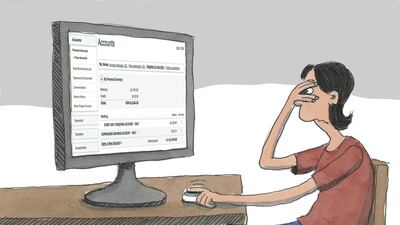Knowing my bank balance saved me from being defrauded. I was roughly a Dh1,000 off the mark – but still, I knew enough to be sure that the person on the phone was scamming me.
At first, I felt mild shock and the beginnings of panic as the voice said my account had been subjected to fraudulent activity. He was calling from my bank’s fraud office to check details and stop the transactions if they were payments I had not made.
I wavered - do I believe this person? I told him to prove he was who he said he was. He read out details of an account that holds a few hundred pounds in the UK, as well as various related codes, my address and date of birth.
Truth be told, no matter what you ‘know’, it’s still unnerving to have that information read out to you while you are in a compromising situation. In my case, it was 20 minutes until my flight would be airborne; I’d be hanging in limbo for hours, wondering what was going on with my account and whether there would be any cash in it by the time I landed. Because it was just beyond the end of the working day, I could not call my bank to verify what I was being told. Clever. Very clever. The fraudster had no way of knowing I was sitting in a plane, but timing the call to coincide with literally minutes past closing time was deliberate.
I had the presence to ask the person what the last two transactions had been from my account. He relayed two that were not my doing, stating amounts that were significantly above what I knew was the rough balance.
Saved. It was obviously a fraud I decided and put the phone down.
He had just been asking what time I would be home, with my PINsentry card-reader, a handheld device that generates a code needed for a transaction to go through when used with my bank card, so that he could call back and cancel the transactions. Otherwise, he warned, it would not be possible to recover the money. I had nowhere near enough to cover one, let alone both transactions. If he was calling from my bank, he’d know this, and he’d also know I had no overdraft facility, which meant neither transaction would be honoured by the bank.
___________
Read more:
How our parents handle money affects our financial behaviour as adults
The real cost of divorce is far worse than the financial outlay
Students must master personal finance before flying off to university
Monopoly may be a game but it comes with serious life lessons
___________
I had saved myself from becoming a bank transfer fraud victim. These scams involve people being tricked into making payment to fraudsters often posing as the police, the bank, utility or telecoms firms, solicitors or builders over phone, text or email. Last year, in the UK, £236 million (Dh1,117.4) was lost this way. Living in the UAE does not save you from being a target – cross-border online banking, accounts held in home-countries, and financial activity and commitment outside the Emirates expose us to this risk.
The fake bank employee ruse that I was subjected to is a common one. And the banks will wash their hands of your problem if possible. This is why only £60m of the £236m was recovered.
There are many reasons why it’s good to know your bank balance. This is now another.
The truth is that I am more aware of balances when I have to make sure I don’t have a cash-flow crunch. I admit that I am often not on top of the figures. This experience got me thinking: when do we check our balances and why?
It turns out that we do it when we’re expecting good news – such as a payment. And the more we have, the more likely we are to check. We’re 200 per cent more likely to check balances on payday, if we are cash-rich. Only 3 per cent of people check their accounts on payday if they don’t have much. This according to researchers at the Copenhagen Business School and Columbia Business School shared by the National Bureau of Economic Research.
The thing is, the less we have, the more vital it is that we know where we are at financially - but many fail to keep track.
Which is why these two terms are often associated with the financially stretched: the ‘ostrich effect’; head in the sand, what you don’t know, you don’t need to deal with. And ‘bank balance anxiety’ - a very real thing for so many – where you could sweat, panic, and practice avoidance as a result. And stick your head in the sand.
If this is you, sit down, log on and look at your bank balance. Acknowledge your current reality, and decide what you are going to do to change it. Think of it as exposure therapy: the more you do it, the less scary it becomes.
And do it regularly. Schedule a day a week if you must.
Do you know what your bank balance is? It could save you losing everything you have.
Nima Abu Wardeh is a broadcast journalist, columnist and blogger. Share her journey on finding-nima.com

